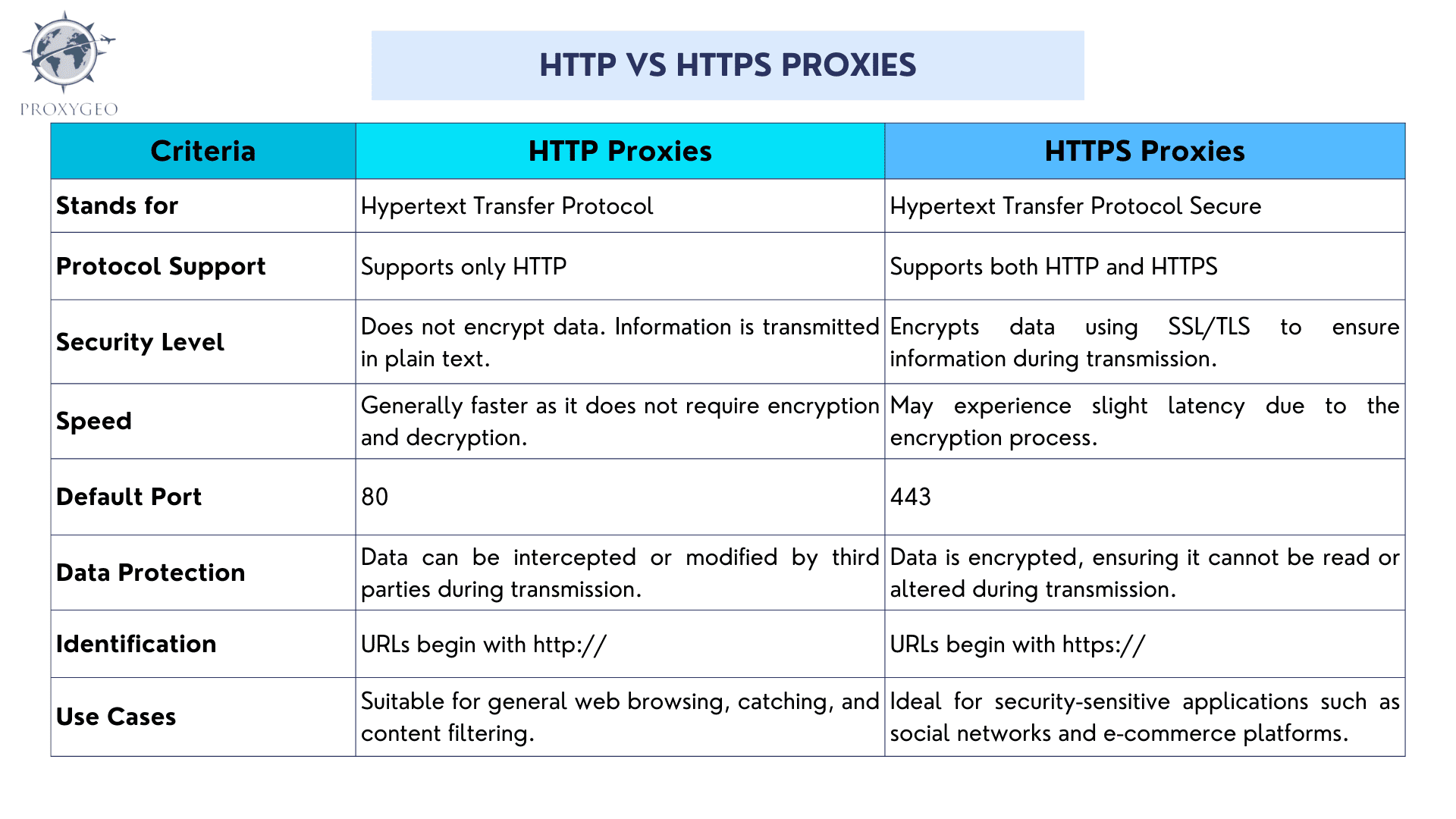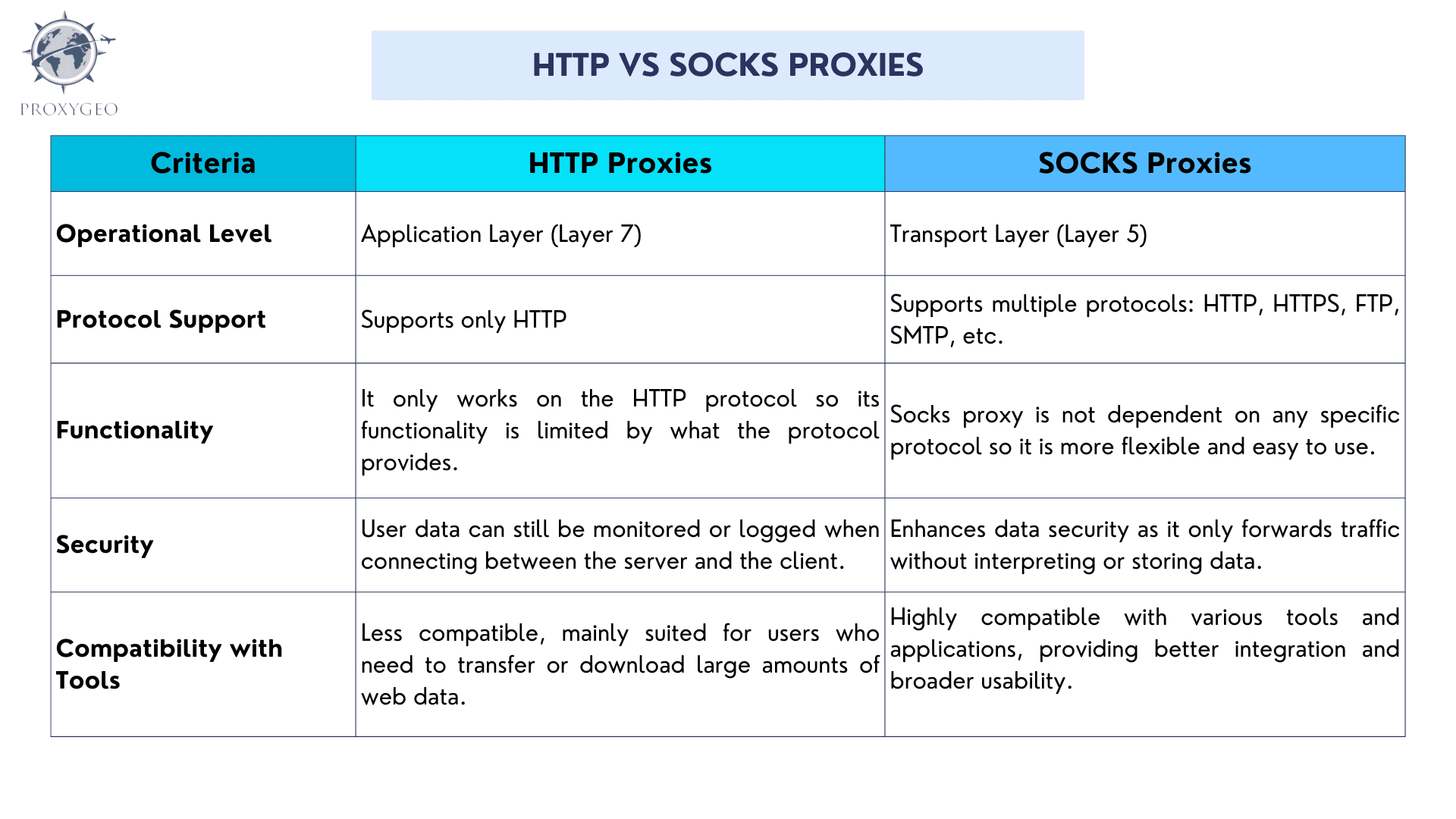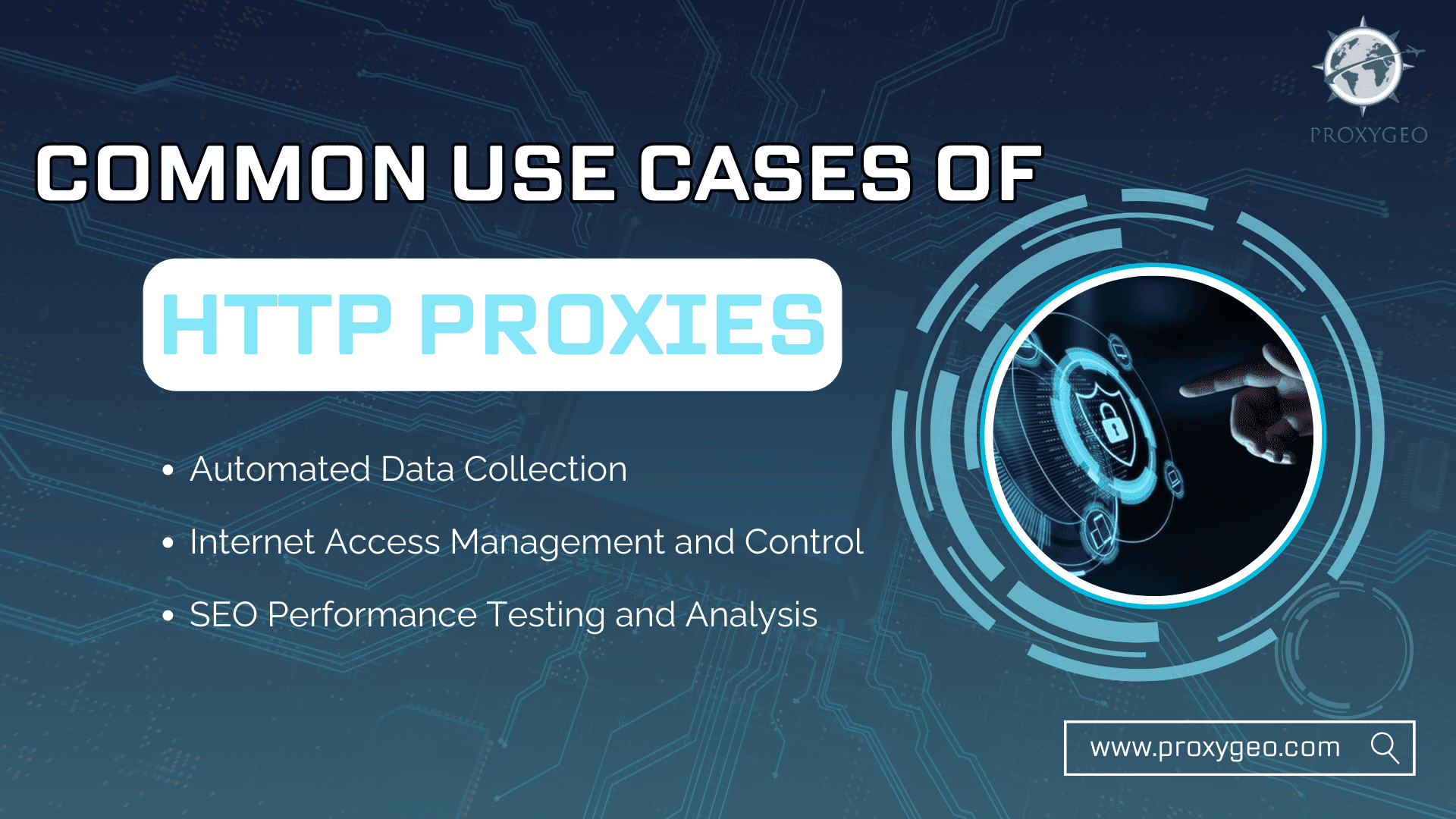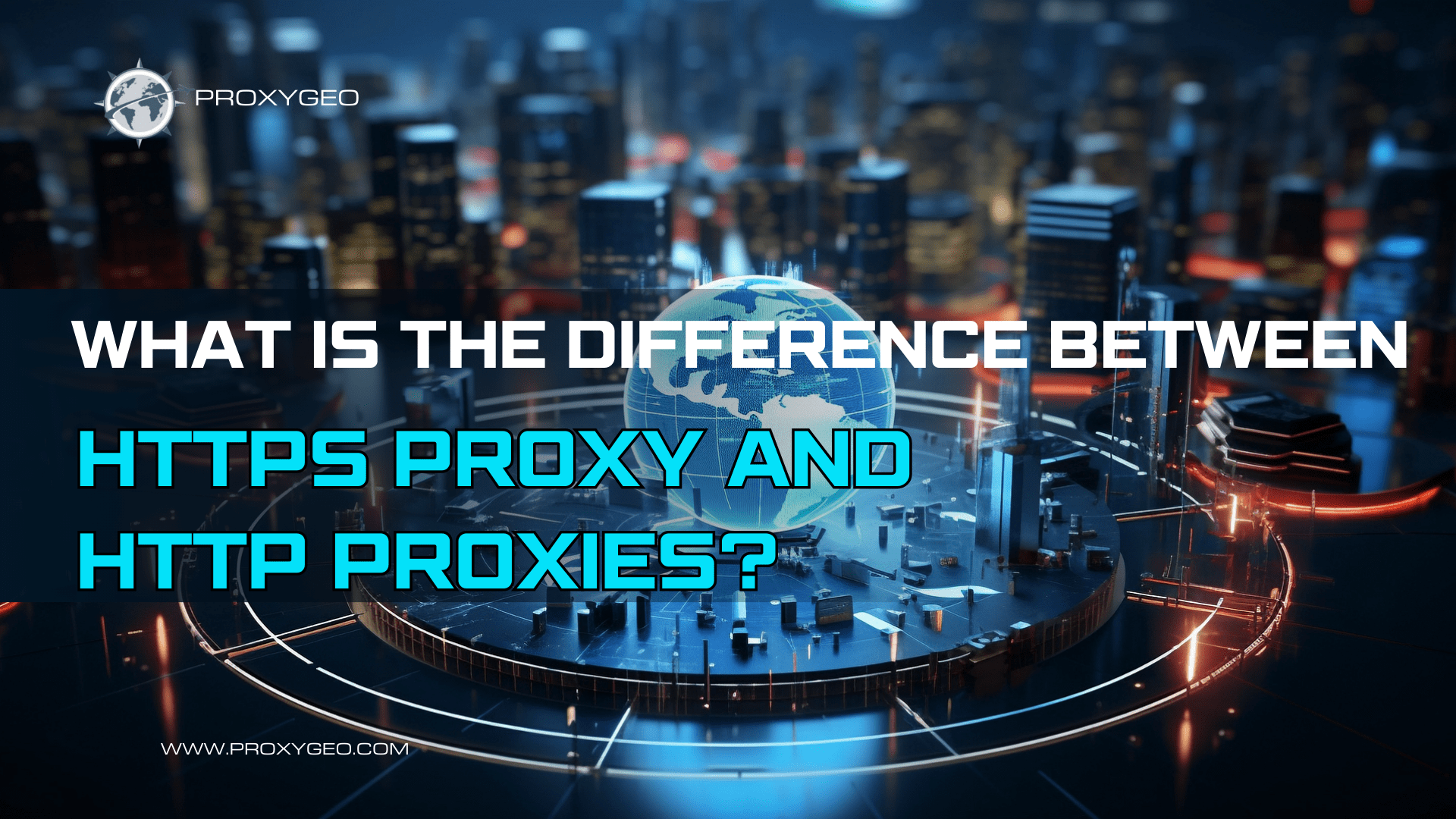In the ever-evolving digital landscape, protecting privacy and optimizing the online experience have become more crucial than ever. Every time you browse the web, traces of your activity may be left behind, increasing the risk of exposing personal information. Proxies serve as a tool that not only hides your online footprint but also boosts browsing speed and secures personal data. However, not all proxies function the same way. Each has specialized characteristics and ways of working that cater to certain purposes. In this article, we will explore the key differences between HTTP proxies and HTTPS, Socks proxies, highlighting their advantages and helping you determine the best solution for your requirements.
What Is An HTTP Proxy?
An HTTP proxy is a server that acts as an intermediary between a user’s device and the internet. This configuration directs web traffic through the proxy server, replacing the user’s IP address with the server’s. When users send a request to a web server, the request is first routed through the HTTP proxy instead of directly accessing the server. The proxy then hides the user’s real IP address before forwarding these requests to the target web server.
Acting as an HTTP client, the proxy protects the user’s device or office network by filtering traffic, allowing only authorized requests to reach the destination. Simultaneously, functioning as an HTTP server, the proxy inspects incoming traffic, analyzes it, and blocks harmful packets such as malware or viruses to protect the web server from potential threats.
What Is An HTTPS Proxy?
HTTPS proxies are the secure version of the HTTP protocol. While HTTP transmits unencrypted data, HTTPS adds an extra layer of security by combining HTTP with SSL and TLS encryption technology. This helps protect data during transmission over the internet, preventing hackers or third parties from stealing sensitive information. If you have ever visited websites with a padlock icon in the address bar, that is a sign of HTTPS. Both HTTP and HTTPS proxies are widely used. Although they may appear similar, they differ significantly in functionality, security level, and practical applications.

What Is A Socks Proxy?
A Socks proxy is an internet protocol used for tasks requiring high traffic. When using a Socks proxy, your internet traffic is routed through a proxy server using a TCP connection instead of being sent directly from the client. People often confuse SOCKS and HTTP proxies, as both serve as intermediaries for data transmission and do not encrypt traffic. Unlike an HTTP proxy; however, a Socks proxy does not modify or interfere with transmitted data, it simply forwards it without analyzing the content. In particular, Socks proxies can operate with any network protocol on any port, making them more flexible and versatile than HTTP or HTTPS proxies.

Comparing Proxy Types: Which Option Fits Your Needs?
Performance
HTTP proxy servers can cache frequently accessed web content. When you request a website that has been accessed before, the proxy server can return a cached version, reducing bandwidth usage and improving page load times. This mechanism enhances overall browsing performance, particularly for websites with high traffic. Additionally, it offloads the primary server, managing multiple user requests while sending only a single request to the server and then redistributing the data. The proxy optimizes the network pathway by selecting the fastest route, ensuring a stable connection, and minimizing latency, even when accessing remote servers.
Compared to HTTP proxies, HTTPS proxies tend to be slightly slower due to their encryption processes. Although HTTPS enhances security by encrypting data between the user and the web server, the encryption and decryption process introduces a certain degree of latency. As a result, HTTPS proxies are not optimal for scenarios requiring high-speed access, such as general web browsing or loading large websites.
By comparison, Socks proxies do not support caching, they solely forward data without interfering with the content. Therefore, sock proxies handle large concurrent connections more effectively, making them suitable for firewall circumvention and high-volume traffic applications. That said, Socks proxies may be less efficient for basic web browsing tasks than HTTP proxies because they cannot speed up page loading through caching.
Security
The HTTP protocol lacks built-in security due to the absence of SSL support, making it vulnerable to data interception during transmission between the client and the server. From a security perspective, HTTPS proxies are still the superior choice as they encrypt all data transmitted between the browser and the web server. Even if third parties like hackers intercept the data during transmission, they remain unreadable. In cases where the website does not contain sensitive information or in normal commercial transactions, HTTP may still be a viable option. However, for enhanced data protection, you should always prioritize HTTPS proxies.
Similar to HTTPS proxies, Socks proxies offer better security than HTTP proxies. With an HTTP proxy, user data can still be viewed or recorded during communication between the client and the server, posing a potential risk. In contrast, Socks proxies do not have access to user data, as their sole function is to forward traffic without interpreting or modifying its content.
Content Filtering and Access Control

In terms of content filtering and access control, HTTP Proxy dominates thanks to its ability to analyze and block data based on URLs, HTTP headers, and web page content. They can be configured to restrict access to specific websites, filter keywords in content, or limit access by whitelisting.
HTTPS proxies also deliver content filtering capabilities; however, their filtering abilities are more limited than HTTP proxies due to the mechanics of end-to-end encryption. These proxies can only control access at the domain level, meaning they can block or allow entire websites but cannot inspect or filter specific content within a webpage.
Meanwhile, Socks proxies do not support content filtering or access control because they focus solely on data transmission without analyzing content. They cannot read, inspect, or filter traffic, so they cannot apply web blocking or content filtering methods like HTTP Proxy.
Protocol Flexibility
Protocol flexibility is another crucial factor to consider when choosing the right proxy. HTTP Proxy is limited in scope as it only supports the HTTP protocol, while HTTPS Proxy expands functionality by supporting both HTTP and HTTPS. Both types of proxies operate strictly within the scope of web-based protocols. In contrast, Socks Proxy is superior because it supports a wide range of protocols, including HTTP, HTTPS, FTP, and SMTP, as well as non-standard protocols such as P2P, VoIP, and online gaming. Since it is not restricted to a specific protocol, Socks Proxy offers a higher degree of adaptability, making it an ideal choice for users who require diverse connections without being tied to traditional web protocols.
The choice of proxy type depends on specific needs and use cases. An HTTP proxy remains a valuable tool for web browsing and content access control. Due to their security limitations and protocol support, they may not be the best option for users who prioritize data protection or require broader compatibility. HTTPS proxies are a better alternative as they encrypt all transmitted data, making them suitable for secure transactions and protecting sensitive information. You may consider Socks proxies if you need a proxy for various applications such as gaming, torrenting, or accessing different online services. Although they lack encryption like HTTPS proxies, their ability to support multiple protocols and efficiently handle high-traffic cases helps optimize your needs.
Common Use Cases of HTTP Proxies

Which proxy type is the best solution depends on your specific use case. Below are some scenarios where an HTTP proxy would be an ideal choice:
Automated Data Collection
One of the most common applications of an HTTP proxy is web scraping. When performing this action, automated tools send multiple requests to websites to gather information. Proxies distribute these requests across different IP addresses, minimizing the risk of blocking and preventing detection by the target website. This ensures a smooth data collection process without restrictions from the website.
Businesses often leverage this proxy to collect market data, monitor competitors’ activities, or analyze data to support business decisions. Not only is it beneficial for organizations, but individuals can also use an HTTP proxy to extract data for research projects or personal purposes. This approach helps save a lot of time and optimize the efficiency of data collection across various industries.
Internet Access Management and Control
An HTTP proxy can filter content and control employees’ internet access in organizations or businesses. It is configured to block access to harmful or irrelevant websites, boosting work productivity while protecting the network from threats like malware, phishing, or data breaches. Beyond business applications, people also use this approach in everyday life, particularly for content control and management. For instance, parents can use proxies to restrict access to specific websites or block inappropriate content. By doing so, families can safeguard children from harmful online content and foster a safer and more secure internet environment for all household members.
SEO Performance Testing and Analysis
In marketing and SEO, these proxies are valuable tools for evaluating website performance across various geographic locations. Professionals can use it to access and test how websites display and function in different regions. Instead of paying for specialized tools to test remotely, this solution lets you pretend to be in another country by changing your IP address to match a server in that country. This enables you to optimize your content and advertising strategies to align with local demographics and markets, saving a lot of time and cost.
Criteria for Choosing the Best Proxy Provider

When searching for a reputable proxy service provider, security requirements are equally important, in addition to reasonable pricing. To evaluate the quality of a proxy provider, you can consider the key criteria below:
Customer Support
A reliable service should have a dedicated customer support team available to address issues promptly, especially when you encounter connection problems or configuration difficulties. This helps save time and guarantees a seamless experience for users.
Stability and High-speed
A stable connection ensures consistent service, while fast speeds enhance the browsing experience. Maintaining these key elements minimizes disruptions during use, allowing users to navigate the internet smoothly and efficiently.
Diverse IP Addresses
IP addresses are a crucial factor in determining the effectiveness of using a proxy. It is advisable to look for providers with a wide range of IPs from various countries, making it easier to bypass geographic restrictions and avoid being blocked by websites. Besides, these IP addresses must be clean and are not blacklisted or flagged.
User Positive Feedback
A reputable provider will typically earn numerous positive reviews from customers who have previously used the service. Keep in mind to check reviews and testimonials from other users to gain a comprehensive view of their service quality and reliability.
Where to Rent Affordable and Reliable Proxy Services?

With extensive experience and a diverse global customer base, Proxygeo is a trusted destination for all users’ needs.
- 24/7 Customer Support: Proxygeo provides round-the-clock customer support to quickly resolve any issues, ensuring a seamless experience for users.
- High Reliability: Known for its stability, Proxygeo offers regularly updated proxies, guaranteeing you always have access to fresh and secure IPs for the best possible online experience.
- Diverse Proxy Options: Proxygeo delivers a variety of proxy packages, including popular proxy types such as private proxies, residential proxies, rotating proxies, etc. You can visit Proxygeo.com to review and choose the package that suits your needs. If you do not find the package you want, you can contact our customer service to ask for a customized package.
- Ease of Use: Purchasing and using proxies at Proxygeo is simple and convenient with specific tutorial videos, making it accessible even for those without technical expertise.
Each type of proxy has its own advantages and limitations, making it essential to choose the right one based on specific needs. If you prioritize the speed, HTTP Proxies are the most suitable option. When it comes to high-security criteria, you can consider either HTTPS or Socks proxy. Socks proxy also stands out thanks to its ability to support diverse protocols, making them a more flexible choice than the other two types. In addition, to ensure a stable and secure proxy experience, it is crucial to select a reputable and high-quality proxy service provider.
In the end, thank you for reading the entire post.
For more information, please do not hesitate to contact us at proxygeo.com.

